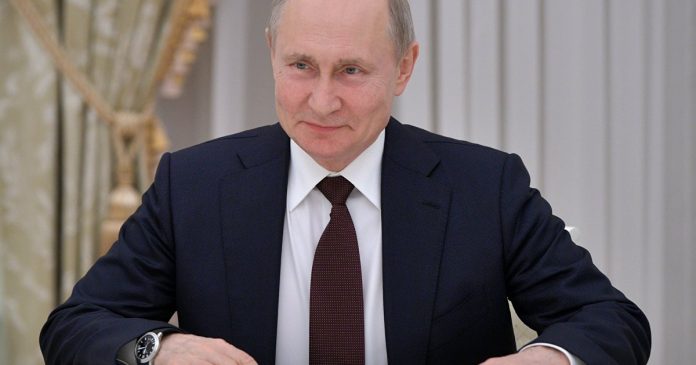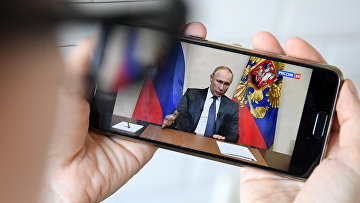
Vladimir Putin, of course, pleased with their actions. The Russian economy was supposed to be in crisis, but this is not happening. COVID-19 has caused a global collapse. The price of oil fell below 30 dollars a barrel, and now it is half cheaper than two months ago. The sale of oil and gas have traditionally made up two-thirds of Russian exports. As a result of quotations of the ruble began to fall. The Russian currency lost almost a third of its value since the beginning of January.
today, However, and most rich countries are in a difficult position. To soften the blow, they take in considerable amounts of debt, while the Russian economy is showing few signs of panic. This happens not as a result of diversification, defeated corruption, protect property rights, enhance competition, investment or economic growth. None of the above not marked. Most likely, the Russian economy less sensitive to such shocks because it was already engaged in self-isolation for the past six years. Immediately after Putin illegally annexed the Crimea and provoked the war in Ukraine, the West imposed sanctions against Russia, and Russia imposed sanctions against the West. After that, the task of the Russian macroeconomics was not to promote growth, and to create the economy as a fortress, able to withstand severe shock. This policy was aimed at supporting fiscal rules in 2017, according to which the country’s budget must be balanced, based on the price of oil just above $ 40 per barrel. Anything above this level headed with an eye for a “rainy day” into a special Fund which in March of this year was 7.3% of gross domestic product (GDP).
as a result, Russia currently has the biggest gold reserves in the world, which account for almost 570 billion. Oleg Vyugin, a former employee of the Central Bank and the Ministry of Finance, explains the current approach: “We are protected from external shocks and foreign enemies because we have modern weapons and rocket, but also because we have gold reserves”. In addition, Russia increased the retirement age for its citizens and increased tax collection through the introduction of digital technology. Mikhail Mishustin, the chief tax collector, was recently appointed to the post of Prime Minister.
of Course, the Russian economy remains highly dependent on energy prices and commodities. The sharp drop in oil prices, partly caused by the decision of Russia to withdraw from the deal with the OPEC countries, may deprive the government this year by about 2 trillion rubles ($25 billion). Risky bet Russia that it can increase its market share and squeeze out of this business is us shale firms can strike back at her in that case, if America decides to conclude their deal with Saudi Arabia at the expense of Russia, said independent analyst Kirill Rogov. However, while Russia has more than enough reserves to last a few years. The fall of the ruble has reduced the damage caused to public finances due to the collapse in oil prices. Western sanctions are also in many cases deprived of much sense of the fact that Western goods now cost more in rubles.
the Context OSW: the Kremlin at the front counter with коронавирусомOśrodek Studiów Wschodnich27.03.2020, the Chinese readers about Putin: Russia is ready for biological warfare (huanqiu shibao)huangzu шибао26.03.2020 Le Figaro, Putin is the only possible captain of the ship “Russia”Le Figaro26.03.2020
OSW: the Kremlin at the front counter with коронавирусомOśrodek Studiów Wschodnich27.03.2020, the Chinese readers about Putin: Russia is ready for biological warfare (huanqiu shibao)huangzu шибао26.03.2020 Le Figaro, Putin is the only possible captain of the ship “Russia”Le Figaro26.03.2020
Being cut off from international capital markets in 2014, Russian companies were forced to reduce borrowings. While Western firms took advantage of low interest rates and accumulated debt, Russian corporate debt has fallen below 50% of GDP, whereas the ratio of public debt to GDP is much less than 20%. Given the fact that Russia exports mostly consists of raw, he was less vulnerable in the case that rupture of global supply chains. “If you travel on a horse, you don’t have to worry about what might be out of gas”, — says Natalia Orlova, chief economist at Alfa Bank.
in addition, Russia is now increasingly can rely on their own strength. Its counter-sanctions imposed against food imports from the EU, provided impetus for the development of their own agriculture, and as a result the share of food imports in the last five years fell by a third and now stands at just 24%.
Life in isolation has its negative side, and this is after the outbreak of the coronavirus have been able to discover many who are outside of Russia. Russia is poorer than it should be. The average growth of its economy in 2014 is a paltry 0.6 percent, that is, only one-fifth of the average global level. The number of small and medium-sized enterprises decreased. Quasi-public firms controlled by friends of Putin, has expanded. Receivedtion benefits through manipulating legislation and economic conditions (rent-seeking) has steadily spread, and this means that opportunities for honest and diligent participants of the economy are extremely low.
the Economic impact of coronavirus, which spread in Russia is probably larger than claimed by the government, most likely, will only deepen the existing in Russia structural problems. March 25, Putin announced measures in the spread of coronavirus, which turned out to be a pale imitation of large-scale economic packages announced by Western governments. Basically, the proposed payment adjustment assigned to the Russian middle class.
rather than close Putin announced the introduction in Russia of the week vacation. In addition, small and medium enterprises receive a tax holiday for a period of six months in respect of payment of corporate tax (the VAT will still have to pay). The social contributions that businesses pay on behalf of their employees, halved and amount to 15%.
Measures of the President to support well-being are relatively modest. The government intends to increase child benefit up to 5,000 rubles ($63), and the unemployment benefit will be increased by one third and will reach 12 thousand rubles. Those people who because of illness will lose more than 30% of their income will be able to defer payments on mortgages and some other loans.
To compensate such a blow to the state budget, Putin has increased taxes on dividends received from offshore assets from 2% to 15%, which, in fact, is a new tax on the rich. Entered the package demonstrates that Putin is more worried about the support of the state, than about preserving the Russian marketfull-time Economics in the form in which it is present.
As noted by Ruben Enikolopov from the Moscow Higher school of Economics, the biggest risk facing Russia is not associated with economic and social collapse which may take place if millions of people lose livelihood and are in critical condition, private firms will be reduced even more. Putin has long been said about the revival of the social state of the Soviet style. The current risks can show that instead, he created a corporate state that has little interest in the lives of ordinary citizens.
the new York times contain estimates of the solely foreign media and do not reflect the views of the editorial Board of the new York times.
















